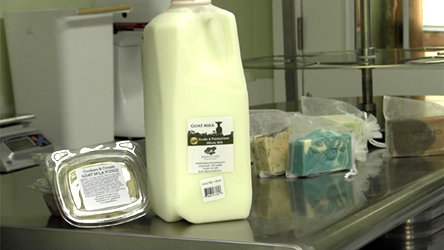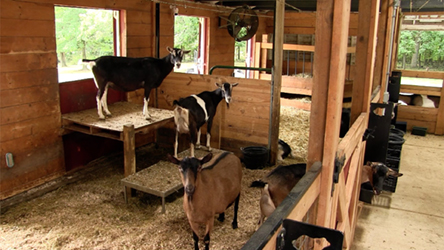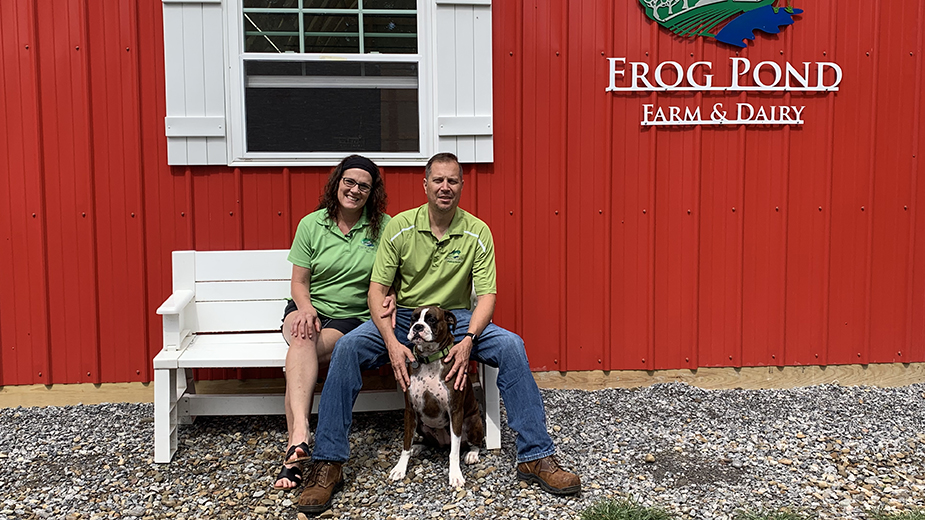CANFIELD, Ohio – Marsha Coakley grew up next door to her uncle’s farm. She remembers being chased around by the goats and thinking they were mean.
Now Marsha is the proud owner of more than 40 goats with her husband, David Coakley. What initially started as two goats for eating grass and personal milk use has evolved into Frog Pond Farm & Dairy – a small Canfield goat dairy business.
“We had talked about being a little more self-sufficient on things,” says David. “It just kind of morphed into this. In 2015, we got our first two goats and it snowballed from there.”

The Coakleys say they are the only Grade A goat milk producer in northeastern Ohio. All milk produced at the farm is chilled and processed in-house.
“It was all a complete accident,” says Marsha. “We had purchased two goats just to eat down the pastures and maybe get milk from for personal use. I made a batch of soap when we first got the milk and I started making more it. Somehow, the district manager of the Hallmark chain wanted this in 13 stores a few months later.”
One initial issue that David noticed was that while goat products are increasing in popularity in big cities, there was not much of a local market.
“I think it’s just a lack of education on the benefits of goat milk and the benefits of the soap,” David says. “I think people are pleasantly surprised, especially when they drink the milk. They have the sense that it’s going to taste like goat. But when they drink it, it doesn’t taste like that at all.”
David says there are a variety of benefits to using goat milk, such as being suitable for many lactose intolerant people and, when used in soaps, in treating skin ailments such as eczema.
A goat dairy is much more eco-friendly than a cow dairy, he adds.
“There is a lot of bad press for cow dairies – obviously with methane emissions,” he says. “Goat dairy produces so much less and is so much friendlier to your carbon footprint.”
The business has seen a lot of growth in recent years, Marsha says, as she recalls its early days.
“We were milking one or two goats by hand at the time and it wasn’t anything like we have now,” she says. “It was just a wooden stand, milking by hand twice a day and I was making soap in the corner of my laundry room.”
While David still works a job outside of the farm, as the business grew, Marsha quit her full-time job to take on the farm duties.
“We don’t want to be a factory farm,” says Marsha. “We want to be a small farm that has a good footprint in the environment.”
Over the years, the couple has become attached to their animals, which they say have become a big part of their life.

“Just because a goat is not producing doesn’t mean we necessarily get rid of them,” says David. “Isabelle is 7 years old and hasn’t produced a drop of milk in six years, but she still gets to hang out and be a goat.”
Marsha says she prides herself on the fact that her goats are more than just numbers. Each has a name that they respond to and many were born and raised on the farm.
“I bottle-raised all of them,” says Marsha. “I am their mom and they all have a name and they all know their names. A lot of other places have their animals numbered. Ours have names.”
A second barn recently was built to make room for even more goats. In the future, customers may be seeing more available products as well.
“We still learn new things everyday,” says Marsha. “I have done some complicated jobs in my lifetime and you have to learn so much to run a farm.”
Goat milk, soap, fudge and more are now available at about 16 local retail locations. Products are also available online at FrogPondFarm.us and at local flea markets.
Pictured at top: David and Marsha Coakley own Frog Pond Farm & Dairy.
